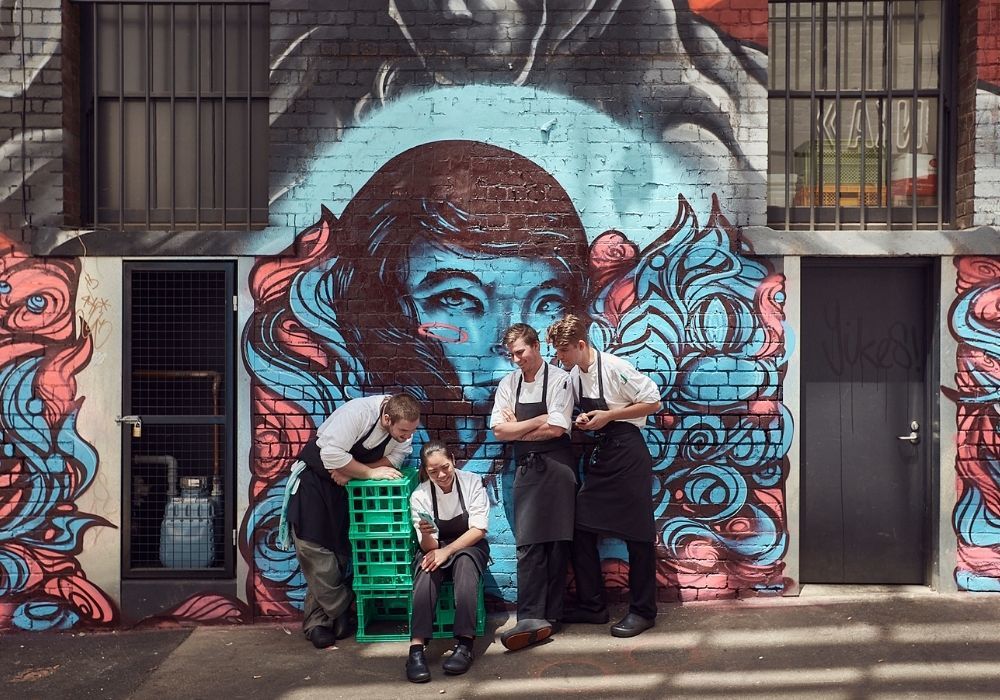Apprentice chefs would be forgiven for feeling a little worried right now. Restaurants are closing on every corner, and institutions that would’ve normally lasted a lifetime have collapsed. And there’s no denying it: the career of a chef who began in 2010 will be very different to someone who started in 2019. And none of us know how.
“Right now, I don’t know what’s gonna happen in three weeks. People say we will open up on October 19,” says Kay-Lene Tan, the recently-appointed head chef at Duckboard Lane mainstay, Tonka. “But who knows. There’ve been a lot of promises. And none of them panned out.”
It can be stressful not knowing the future – and lately everyone’s had more than their fair share of stress. But Kay-Lene, when she looks squarely at her current situation, has decided things ain’t all bad.
“I’ve been listening to Michelle Obama’s podcast, and she says: “The future is written in pencil.” I think that’s very poetic, particularly in the current situation”
While a post-covid future remains entirely uncertain, what’s more reliable is the situation on the ground. And, there’s a little spark of light for people at the start of their careers.
Some kitchens – like Tonka’s – responded rapidly to lockdown restrictions, instituting new ideas. And, while there’s no denying the widespread hardship in the industry – 88,000 jobs have already been lost – some restaurants have discovered that the pandemic has pushed them closer to doing what they actually want.
“There are a lot of businesses who have suffered,” says Kay-Lene sadly. “But we were the first restaurant to open a grocery store. We wanted to create a takeaway model that was sustainable for us, something that we could continue doing even if we were open for service.”
The model – which sees food prepared in Tonka’s kitchens, using Tonka’s produce and Tonka’s brigade of top-class chefs and delivered by floorstaff in Tonka’s own refrigerated truck – has proved extraordinarily popular. And, it’s actually brought Kay-Lene’s food to people who mightn’t have tried it before.
“It’s great, because it makes our food a lot more accessible to a lot more people moving forward, who are really enjoying it,” she explains. “And, there’s transparancy around the food the customer’s eating – where it’s from, how you cook it, how it’s being served.”
So, the fact is that while the prospect of being a chef has unutterably altered, exciting opportunities still exist. Kay-Lene (who came late to cookery, ditching her career as a documentary filmmaker for her love for cake) advises apprentices to be flexible.
“There are a lot of new things to learn now. I cannot explain how much I’ve learned in the last six months – not just about our food, but about packaging and manufacturing, and the energy it takes into something simple like packaging a butter chicken,” she says. “If you were an apprentice and you were coming into the industry now, it’d be about setting a different set of expectations.”
But that’s cool – right? Who wants to do a job where there’s nothing to learn?
“If you were coming into the industry now, I’d say you’d need a lot of patience. And tenacity,” Kay-Lene suggests. “And you need to be able to be a chamelion, really change with the times. Sometimes that’s just a lot of listening.”
While there’s still plenty of opportunity in the future of hospitality, that’s not to deny that some jobs will be – well – shit.
“I get it: when my apprentices stand for three hours vacuum-sealing curries, I’m sure that’s not like their dream of being a chef,” Kay-Lene admits. “But it’s the little things you take out of it.How to be clean. How to be organised. All these little things that seem unimportant are actually really important in the big picture.”
And, while you’re stuffing butter chicken (cleanly) into a plastic sack, right now is an unprecedented time for pitching recipe ideas.
“Right now, we can talk to one another while we’re shelling peas. Not just about the weather – but about what you want to do, what you could do, and how the restaurant could be better,” she says. “If you have a cool concept, let’s talk about it for a takeaway dish. Now’s a good time. There’s a lot more room to have those conversations when you’re not yelling out orders.”
Ultimately, Kay-Lene reckons young chefs just have to face reality: while the situation’s tough, it won’t be this way forever. Young chefs might be in the weeds right now, but like every service, they’ll tough it out.
“People don’t like change. I’m always very hesitant when it comes to change,” says Kay-Lene. “But in order to be successful in this industry now, you’ve got to take everything as it comes. With a very positive mindset.”
To keep up to date with food industry news and Fine Food Australia updates, subscribe here.

